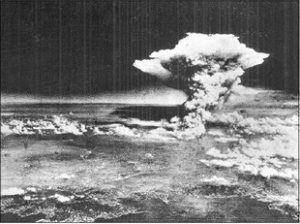Greenfield Recorder, August 5, 2020
MY TURN
By TIMMON WALLIS and VICKI ELSON
After 75 years of living with nuclear weapons, we have an opportunity to eliminate them from the face of the earth forever. We can even shift the resources we’re wasting on these weapons of mass extinction to green technologies and other pressing needs.
The Treaty on the Prohibition of Nuclear Weapons was adopted by 122 countries at the UN in 2017. It finally and conclusively outlaws nuclear weapons, like chemical and biological weapons. The treaty describes nuclear weapons, whose only purpose is to slaughter civilians, as an unacceptable risk to all of humanity.
By establishing an international norm that totally rejects nuclear weapons, the Treaty on the Prohibition of Nuclear Weapons is undermining the logic of so-called “nuclear deterrence,” a fallacy that continues to be the only justification for these weapons to exist. It’s also beginning to undermine the consensus among allies and partners of the United States that these weapons will remain an integral part of their “defense” strategies for the indefinite future.
Of course, the US and the other eight nuclear-armed nations hate this treaty and refuse to sign it. Nevertheless, the Treaty on the Prohibition of Nuclear Weapons clearly represents the will of the international community as a whole, and its impact is already being felt by the U.S. and the other nuclear nations.
Fifty countries need to ratify this treaty in order for it to enter into force as international law. As of July 2020, it has 40 ratifications. Another 40 countries are in the process of ratifying the treaty, and at least 40 more are committed to signing and ratifying it. Even before it enters into force, however, we can be building support for this treaty here in the US.
The Warheads to Windmills campaign urges Congress to shift the money, brainpower and international goodwill currently squandered on nuclear weapons to address climate change through a Green New Deal. Our report, available free at NuclearBan. US/w2w, has been embraced by Rep. Jim McGovern and other members of Congress. We are proud to have supported Rep. Eleanor Holmes Norton in introducing H.R. 2419, federal legislation that shares the same goals.
Why is this so urgent? Today’s nuclear weapons are vastly more powerful than the bombs that obliterated the cities of Hiroshima and Nagasaki, killing over 200,000 people exactly 75 years ago this month. Currently, the U.S. has enough nuclear firepower to destroy 50,000 Hiroshimas.
Nuclear attack, or even all-out nuclear war, can be started on purpose or by accident. At least a dozen times besides the famous Cuban Missile Crisis, the world has come within minutes of all-out nuclear war. A flock of geese was mistaken for incoming missiles. A message about a harmless satellite launch did not get to the right person at the right time. A simulated war game attack was misinterpreted as an actual attack.
Despite all the treaties and reductions in stockpiles, the risk of nuclear war has not gone away. In fact, according to the “doomsday clock” of the Bulletin of Atomic Scientists, the risk is now greater than at any time during the Cold War. Thousands of nuclear weapons remain on hair-trigger alert, ready to be launched within a matter of minutes. The systems that control these weapons are vulnerable to computer malfunction and to cyber-attack. The people responsible for them are vulnerable to human error, fatigue, alcohol and drug abuse, and misunderstandings.
Most countries of the world (186 out of 195) do not have nuclear weapons, and do not intend to ever have nuclear weapons. But if there were even a “limited” nuclear war (say, between India and Pakistan), those two countries would not be the only ones affected. Just like the coronavirus, radiation knows no boundaries and can spread around the globe. Smoke from burning cities can also affect the global climate and potentially cause massive crop failures affecting billions of people, far from the zone of conflict. Nuclear weapons are a danger to the whole world, and the whole world has decided to deal with them.
We are the country that invented nuclear weapons, and we’re the only country that has ever used them. On this 75th anniversary of that tragedy, it’s time for our country to help bring this appalling chapter to a close.

Timmon Wallis and Vicki Elson, of Northampton, run Nuclear-Ban.US, a member of the Nobel-Prize winning International Campaign to Abolish Nuclear Weapons.